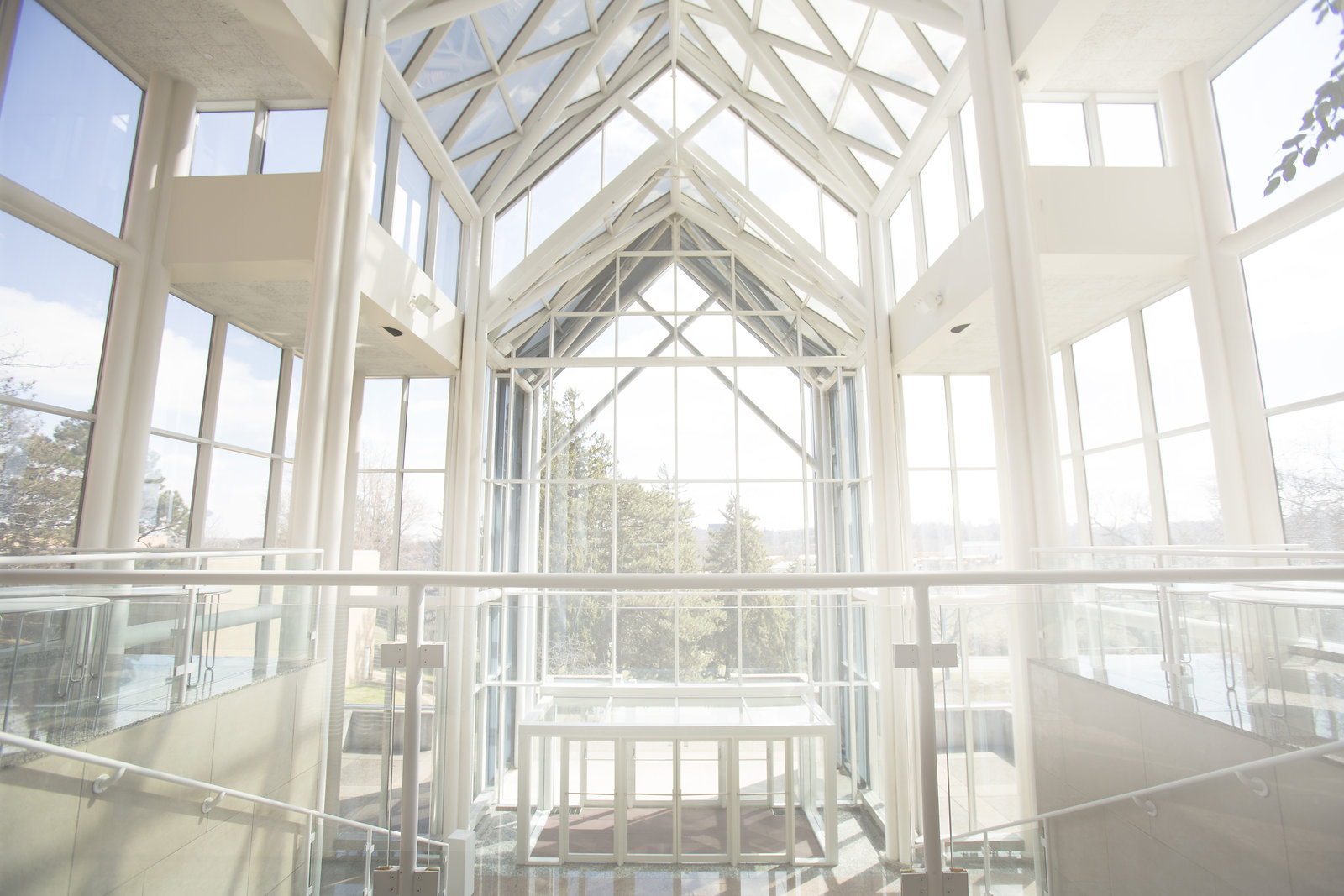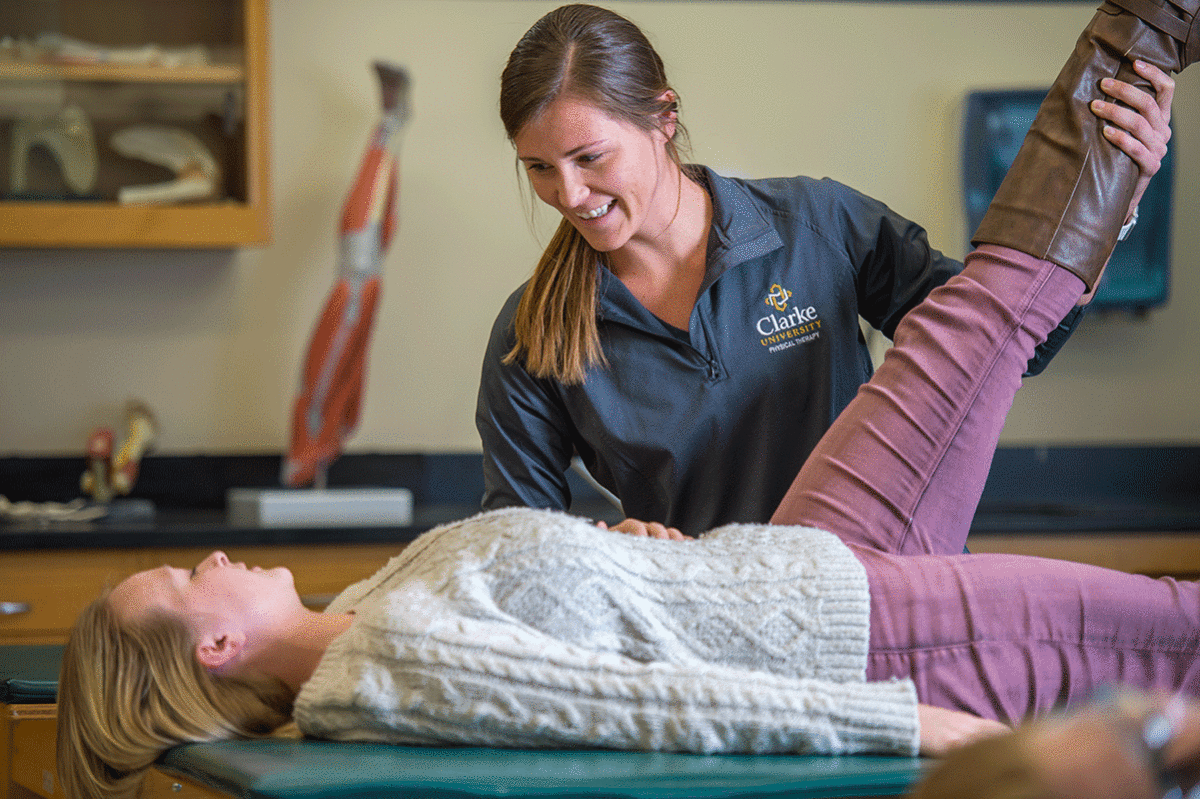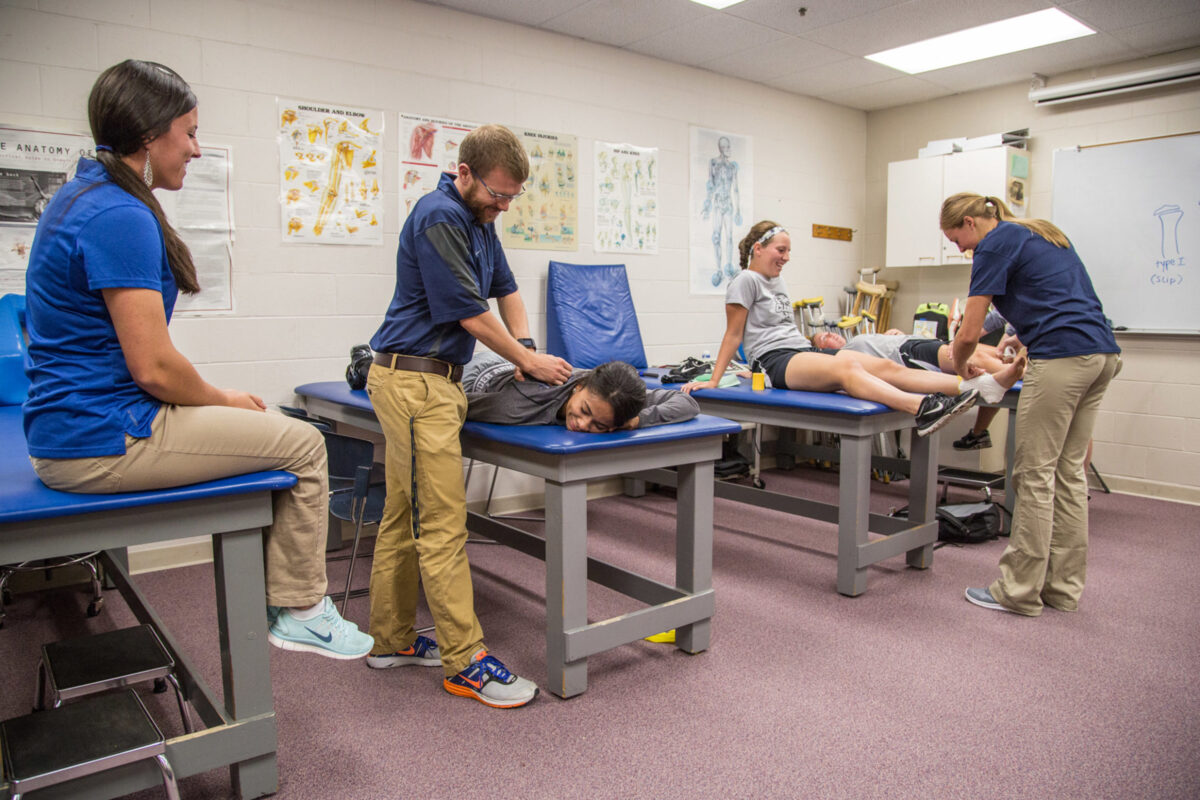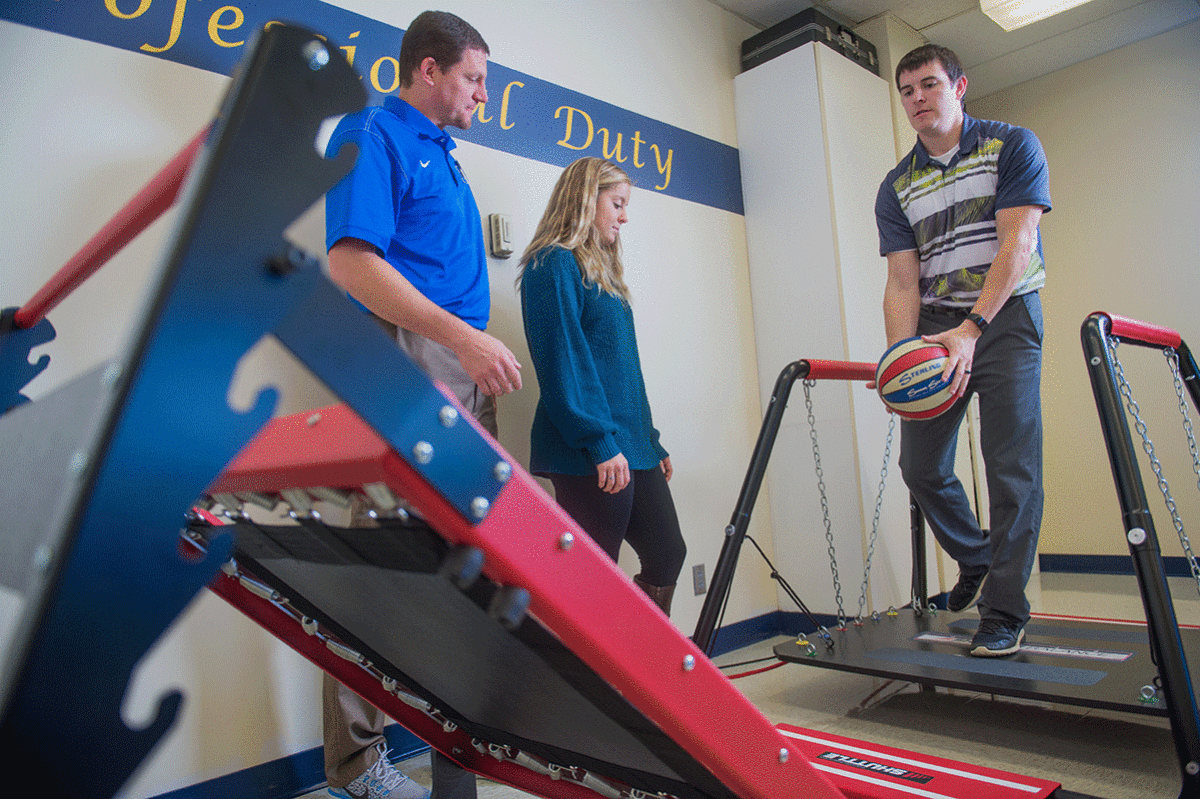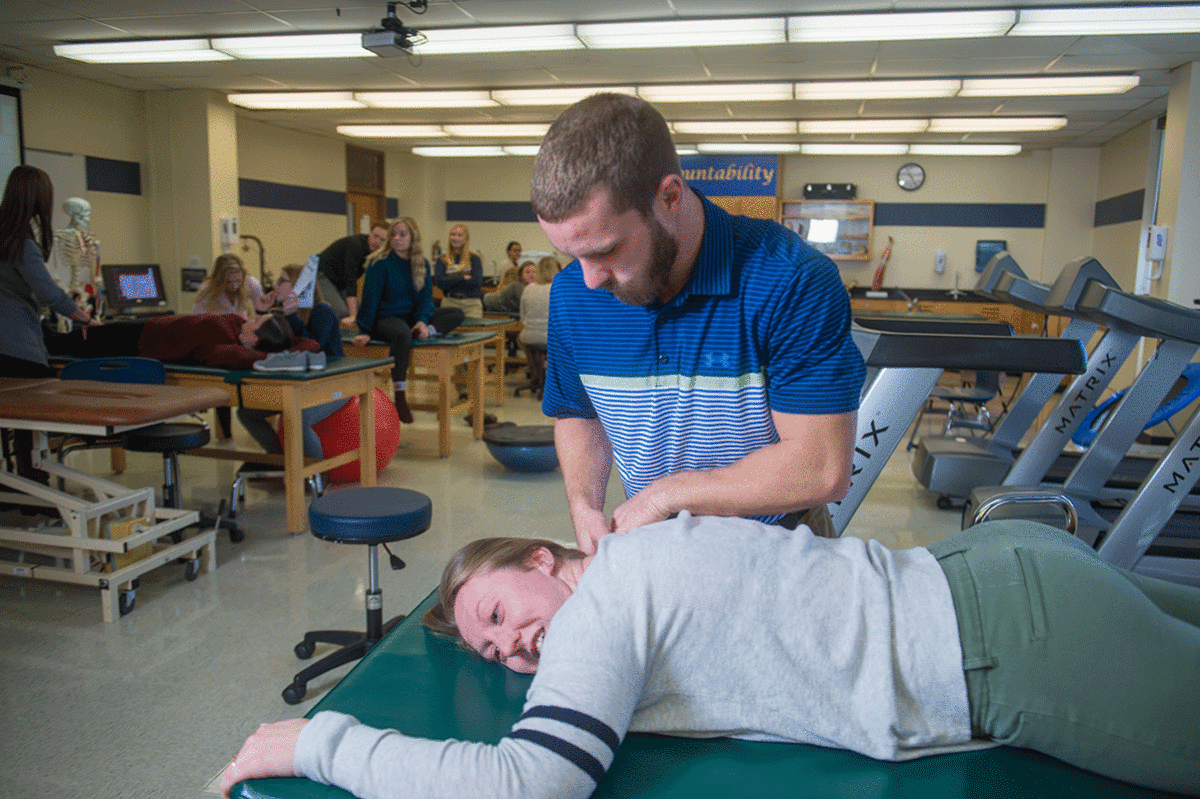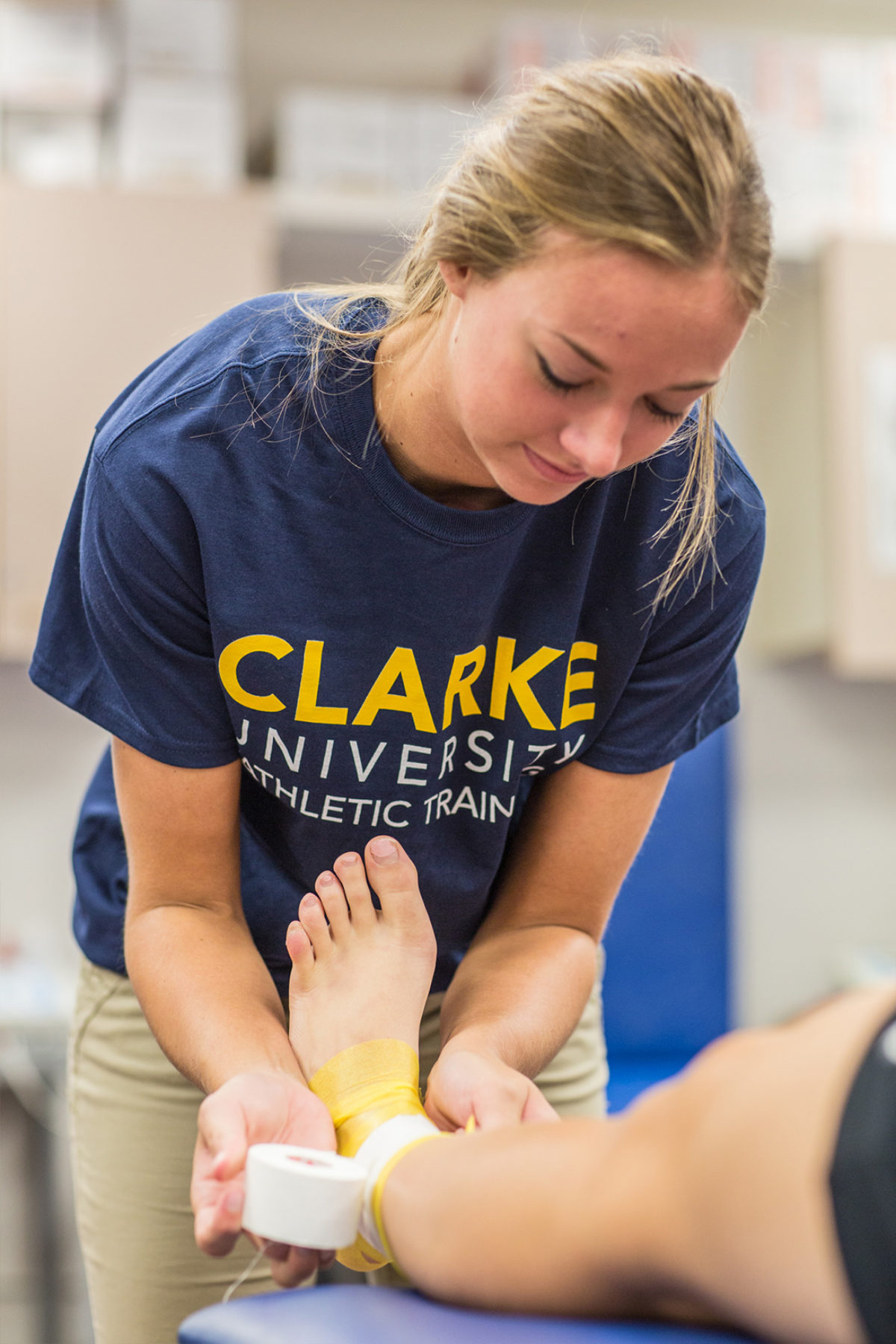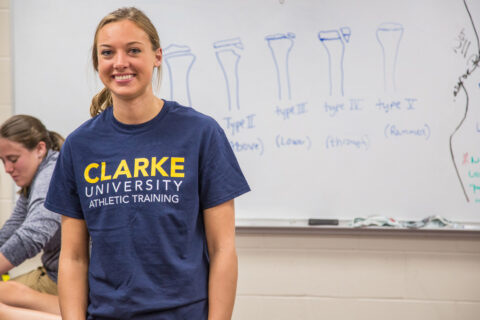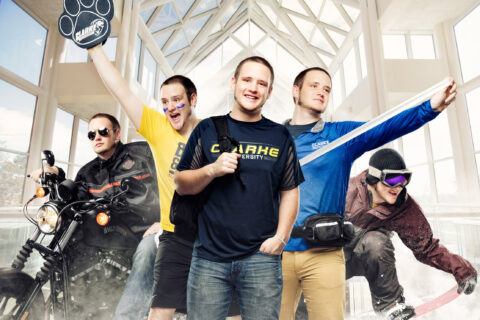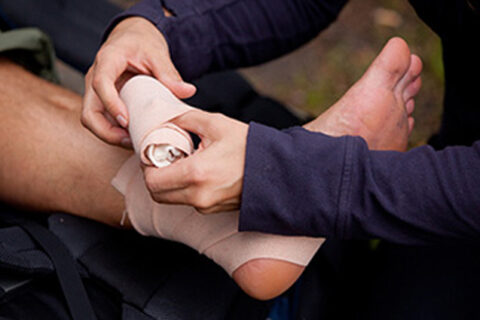Dee Higgins, Ph.D.
Every patient and every student is inherently good, is worth time, effort and care, and deserves your best efforts.
Clarke University received full accreditation for its Athletic Training Program (Bachelor of Science) for a maximum of 10 years from CAATE (Commission on Accreditation of Athletic Training Education) in 2017-2018. With this successful accreditation review, Clarke University has a goal to move toward the offering of a Masters in Athletic Training.
Clarke students accepted into the professional phase of the Athletic Training Program before the end of Spring semester 2020, will be completing the Bachelor of Science.
Clarke’s ATP is phasing out the Bachelor’s in Athletic Training Degree (BS) and phasing in the Master of Athletic Training Degree (MAT). Clarke University’s Athletic Training Program (ATP) helps athletic training students develop an understanding and appreciation of the many dimensions of humans – structural, functional, psychological, emotional, and spiritual. Our ATP emphasizes the development of critical thinking and problem-solving skills, which are vital for a competent practitioner in today’s evolving health care environment.
Clarke ATP students will be supervised while administering emergency, immediate and follow up care. ATP students will also be supervised while developing athletic injury prevention, treatment, and rehabilitation programs using knowledge of biomechanics, anatomy, and pathology. ATP students will be prepared to become a Certified Athletic Trainer (ATC) and emerge from Clarke University’s ATP a generalist in the healthcare/medical professional with skills in prevention, evaluation, therapeutic interventions recovery and return to participation.
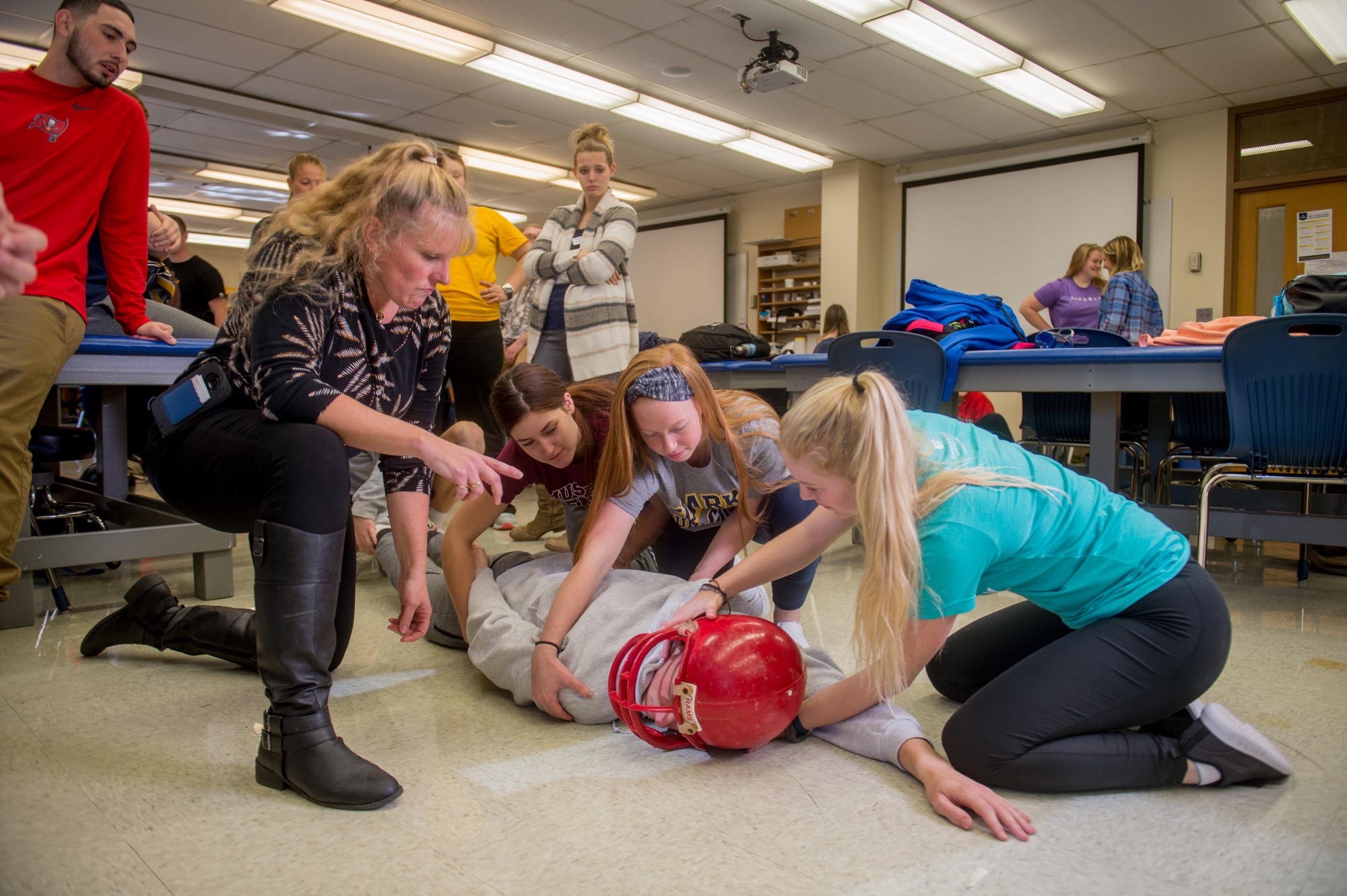
Clarke University’s athletic training students working to achieve their degree in athletic training have access to an active student organization, Clarke Athletic Training Society (CATS). The organization helps spread the awareness of the athletic training profession and develop professional skills among students in the field. Athletic training students participate in community education and helping services projects. Clarke athletic training students and faculty engage with community education and helping services by:
Interested in health and fitness as a career? Want to see first-hand how our athletic training students learn? Take a visit to scenic Dubuque, Iowa, and visit the Clarke University campus or view our virtual tour. We will walk you through all the details of becoming a Certified Athletic Trainer.
In Clarke’s Athletic Training Program (ATP), you’ll study a variety of subjects, including anatomy with a cadaver lab, chemistry, psychology, ethics, and research. The athletic training degree courses focus on discipline-specific topics, such as diagnostics, interventions, administrative principles, current issues, and management practices necessary for obtaining and working in an athletic training career. You will complete hands-on clinical experiences supervised by physicians, licensed and certified athletic trainers and/or clinical faculty/preceptors.
Athletic training classes that make an impact
Here is a sampling of the types of classes you’ll explore as a Clarke University Athletic Training student:
CLINICAL EDUCATION IN ATHLETIC TRAINING courses—Students have the opportunity to go to Clarke University-affiliated athletic training facilities to practice skills on real patients
CARE & PREVENTION OF INJURIES—You’ll gain knowledge of the basic science related to the prevention, care, and recovery of injuries.
ACUTE & EMERGENCY CARE and BASIC LIFE-SAVING TRAINING FOR HEALTHCARE AND PUBLIC SAFETY—Learn acute, immediate, and emergency situation recognition, intervention, care, and referral skills.
Athletic Training Rotations
Clarke’s Athletic Training students currently complete clinical experiences/rotations in Dubuque, Iowa, and other area high schools, colleges, physician offices, health care facilities, and health services offices, including, but not limited to:
Athletic Training Clinical Experiences associated with Clinical Education courses
Students must log a minimum of 1000 hours and a maximum of 2000 hours of clinical education time in order to graduate. Ordinarily, no student is allowed to log more than 20 hours and no less than 2 hours in a calendar week (Sunday through Saturday) during full academic weeks. During summer, intersection, and non-academic calendar weeks students may log up to 40 hours per week. A student must have a minimum of 1 day off of clinical in every 7 calendar days. Students must submit any exceptions to the amount of time spent in clinical education in writing to the Athletic Training Program Director and Clinical Education Coordinator/Clinical Supervisor. Clinical experience hours follow the Clarke University, departmental, programmatic and accrediting body and/or affiliated site’s guidelines and policies as applicable for the credits assigned to the related Clinical Education courses rather than the federal and institutional guidelines for lecture courses or the institutional guidelines for internships. All students must track and report/submit their own hours in accordance with professional/ethical behaviors.
Clarke University has received full accreditation for its Athletic Training Program (Bachelor of Science) for a maximum of 10 years from CAATE (Commission on Accreditation of Athletic Training Education). With this successful accreditation review, Clarke University has a goal to move toward the offering of a Masters in Athletic Training.
BS phasing out:
Students apply for admission to the Athletic Training Program during the spring semester of their first year. Qualified Clarke University students will be given priority for the (approximately) 12 openings in the program per year. Some qualified applicants may not be accepted due to space limitations.
Applicants are considered on an individual basis. Apply to Clarke today to begin your journey.
Master of Athletic Training
After receiving notice of successfully achieving the maximum 10-year continued accreditation from the Commission on Accreditation of Athletic Training (CAATE), Clarke is setting its sights on launching the Master of Athletic Training (MAT) in the near future. The MAT is the new entry-level standard of preparation for athletic training students. Clarke aspires to continue its tradition of preparing industry-leading athletic trainers to the ever-growing and changing healthcare system.
MAT phasing in:
The Clarke University ATP is structured as a 3+2 accelerated program for Clarke students. Clarke students apply for admission to the ATP during the fall semester of their junior/third year of undergraduate studies. Normally, non-Clarke students apply for admission to the ATP during the fall semester of their final year of their bachelor’s degree program. However, due to the pandemic, we have extended our application window, and we are still accepting applications for a July 2023 start. Qualified Clarke University students will be given priority for the (approximately 18) openings in the program per year. Some qualified applicants may not be accepted due to space limitations.
Master of Athletic Training Expenses
Not included in the Graduate tuition per credit hour (MAT), posted in the Graduate Cost section of the Tuition and fees are the following: background checks, health requirements (entrance physical, vaccinations, etc.), laptop, phone, books, access codes, student fees, course fees, transportation to and from classes, clinicals and events, polos or other professional attire/clothing for clinical, additional or appropriate PPE, replacement or additional clinical equipment, graduation fees, NATA membership dues, conferences, additional BOC preparatory materials or courses, application for BOC examination and BOC examination, registration or licensure fees, annual Basic Life Support for Healthcare Professionals/AED certification, professionalism modules (bloodborne pathogens, HIPAA, Title IX, etc.). Other fees may apply, and the University reserves the right to change fees. For information on tuition, fees and aid visit, clarke.edu/tuition.
Careers in Athletic Training
Athletic Training degree students work on each other with feux injuries to practice proper techniques.
Athletic training students are given hands-on experience in each class.
Clarke University Athletic Training students have done experiences abroad in addition to their degree. Abroad experience destinations have included Spain, Scotland, Ireland, and Japan.
Clarke’s athletic training major has an active student organization, Clarke Athletic Training Society (CATS). Members promote and encourage participation in athletic health care through community involvement. CATS helps spread awareness of the profession of athletic training and develops professional skills among students in the field.
Through your Clarke experience, you will be involved in many different activities that will guide you on your college journey. By your senior year, you will have a résumé of all your awesome involvements packaged and ready for your first interview.
What can I do with a degree in this major?
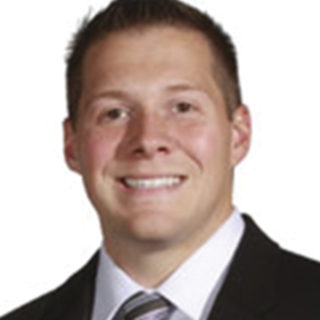
The on-the-field training with a variety of high school and collegiate athletic teams greatly prepared me for any type of career within sports medicine and rehabilitation.
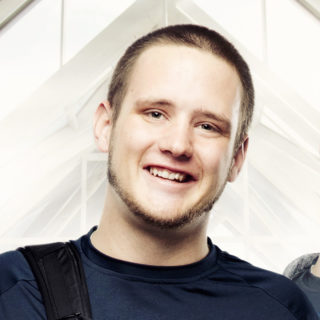
One day while working at Sundown Mountain Resort, I was the first person on the scene when a snowboarder crashed. I had to stabilize his neck. To be able to apply what I am learning in the classroom to a real-life experience is amazing.

I just finished my first clinical rotation with the women’s soccer team. I am always hungry for information and am striving to learn everything about the human body.
According to the U.S. Bureau of Labor Statistics, percent the athletic training workforce will grow through 2022.
Percent of Clarke athletic training graduates who secured a job in their chosen field or enrolled in graduate school by August.
The current median annual wage for athletic trainer degree holders.
In order to practice athletic training, students must pass the BOC certification examination. As described on The Board of Certification, Inc. (BOC) website, the BOC “was incorporated in 1989 to provide a certification program for entry-level Athletic Trainers (ATs). The BOC establishes and regularly reviews both the standards for the practice of athletic training and the continuing education requirements for the BOC Certified ATs. The BOC has the only accredited certification program in the US.”
Clarke was most recently completed an accreditation review in 2017-2018 and received the maximum reaccreditation of 10 years.
All recent accreditation information and program outcomes data can be found on CAATE’s website.
Clarke University’s information and data
All accredited AT programs
Below are the Clarke University’s historical outcomes data.
| Applied AT Program 2013-2014 Began AT Program 2014-2015 | Applied AT Program 2014-2015 Began AT Program 2015-2016 | Applied AT Program 2015-2016 Began AT Program 2016-2017 | Applied AT Program 2016-2017 Began AT Program 2017-2018 | Applied AT Program 2017-2018 Began AT Program 2017-2018 | Applied AT Program 2018-2019 Began AT Program 2019-2020 | Applied AT Program 2019-2020 Began AT Program 2020-2021 | No AT applications were taken | |
|---|---|---|---|---|---|---|---|---|
| Number of students that began AT Program (typically sophomore year) | 8 | 15 | 13 | 12 | 12 | 12 | 8 | |
| Number of students that returned from year 1 to year 2 (junior year) | 8 | 15 | 9 | 11 | 10 | 8 | 4 | |
| Program retention % from year 1 to year 2 (sophomore to junior) | 100.00% | 100.00% | 69.23% | 91.67% | 83.33% | 66.66% | 50.00% | |
| Number of students that returned from year 2 to year 3 (junior to senior year) | 8 | 15 | 8 | 11 | 8 | 8 | 3 | |
| Program retention % from year 2 to year 3 | 100.00% | 100.00% | 88.89% | 100.00% | 80% | 100% | 50.00% | |
| Overall retention % of cohort in the program | 100.00% | 100.00% | 61.54% | 91.67% | not yet available | 66.66% | not yet available | |
| Student graduation rate percentage | 100.00% | 100.00% | 62.00% | 91.67% | not yet available | 66.66% | not yet available | |
| Number of students that graduated | 8 graduated in 2017 | 15 graduated in 2018 | 8 graduated in 2019 | 11 graduated in 2020 | 8 graduated in 2021 | 8 graduated in 2022 | 3 expected graduation in 2023 | |
| Graduating students who took BOC | 8 | 15 | 8 | 11 | 7 | 8 | ||
| Graduating students who decided they will NOT take the BOC exam | 0 | 0 | 0 | 0 | 1 | 0 | ||
| Graduating students who passed BOC exam 1st time | 6 | 12 | 6 | 5 | 7 | 3 | ||
| 1st time pass rate percentage | 75.00% | 80.00% | 75.00% | 45.45% | 100% | 37.5% | ||
| Graduating students who passed BOC exam overall | 7 | 15 | 8 | 8 | 7 | Not yet available | ||
| Pass rate percentage overall | 87.50% | 100.00% | 100% | 72.72% | 100% | |||
| Number of students who decided not to pursue retaking BOC exam after not passing | 1 | 0 | 0 | 3 | 0 | |||
| 3 year aggregate BOC 1st time pass rates | 2017, 2016, 2015 | 2018, 2017, 2016 | 2019,2018, 2017 | 2020, 2019, 2018 | 2021, 2020, 2019 | 2022, 2021, 2020 | ||
| number of students pass/total number of students | 25/32 | 28/35 | 24/31 | 23/34 | 18/26 | 15/26 | ||
| percentage | 78.10% | 80.00% | 77.40% | 67.64% | 69.23% | 57.7% | ||
| 3 year aggregate BOC overall pass rates | 2017, 2016, 2015 | 2018, 2017, 2016 | 2019,2018, 2017 | 2020, 2019, 2018 | 2021, 2020, 2019 | 2022, 2021, 2020 | ||
| number of students pass/total number of students | 29/32 | 33/35 | 29/31 | 28/31 | 23/26 | |||
| percentage | 90.63% | 94.25% | 93.54% | 90.32% | 88.46% | |||
| Post graduation placement rates (Percentage of students within 6 months who have obtained employment) | 3 Year Aggregate | |||||||
| Number of students employed as AT (from all previous years) | 5 | 8 | 5 | 3 | 5 | 3 | ||
| Student employment/placement rate as AT percentage | 62% | 53% | 62% | 27% | 62% | 38% | ||
| Number of students employed as other | 3 | 7 | 2 | 5 | 1 | 1 | ||
| Student employment/placement rate as other percentage | 38% | 47% | 25% | 45% | 12% | 12% | ||
| Number of students not employed (including those enrolled in graduate programs while employed) | 0 | 0 | 1 | 3 | 2 | 2 | ||
| Students not employed percentage (this includes students enrolled in graduate programs who are NOT employed) | 0% | 0% | 12% | 27% | 25% | 25% |
Historical data at a glance:
